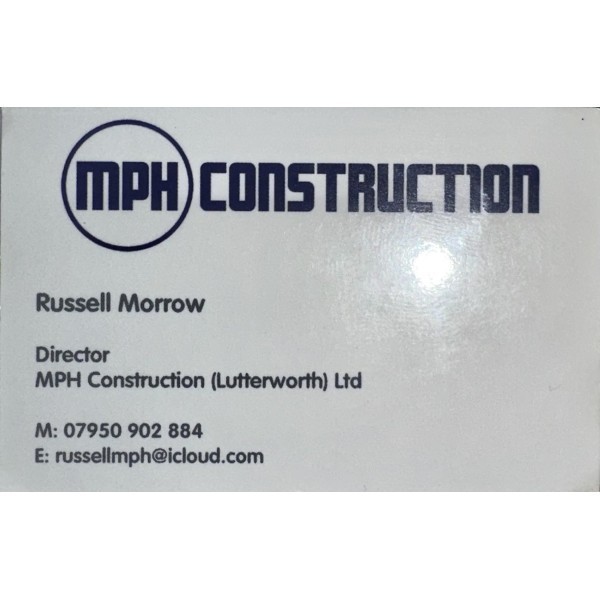Driveway Contractors in Shepshed
Welcome to MPH Construction, your premier choice for expert tradespeople services in Littlethorpe and throughout Leicestershire. As a lea... read more »
Welcome to Home Sweet Home Leicestershire Ltd, your go-to experts for all tradespeople services in Leicester and across Leicestershire. W... read more »
Wright Builders: Your Go-To Builders and Landscaping Specialists in Markeaton, Derbyshire
Welcome to Wright Buil... read more »
Welcome to JMRH Property Maintenance, your trusted partner for all your building and renovation needs in Toton and across Notti... read more »
Isaacs Tree And Garden Services, based in Horninglow, is your go-to solution for all landscaping and garden needs in Sta... read more »
Welcome to Truebond Building Services Ltd, your go-to experts for Extension Builders, Driveway Contractors, D... read more »
Welcome to DS Construction Building and Landscaping Group, your premier choice for top-notch construction and landscaping services in Wet... read more »
Welcome to Wigston Home Improvements, your premier choice for expert tradespeople services in Wigston Magna and throughout Leicestershire... read more »
Welcome to HB Home And Garden Improvements, your premier choice for property maintenance and improvement services in Normanton and across... read more »
Welcome to MS Driveways Ltd, your premier choice for top-notch tradespeople services in Littleover and across Derbyshire. As a leading pr... read more »
Welcome to Prestige Paving & Developments, your trusted builders and driveway contractors in Str... read more »
Welcome to Cobra Construction Ltd, your premier choice for Builders, Extension Builders, Driveway Contractors, and Bathroom Installation... read more »
Welcome to Blackrock Paving, your trusted partner for all your landscaping and paving needs in... read more »
Welcome to TW & Sons Ltd, your trusted partner for al... read more »
Welcome to Nottinghamshire Drives, your premier choic... read more »
Welcome to Valley Road Builders, your trusted builder... read more »
Armoured Drives: Premier Driveway Contractors... read more »
Bradstone Driveways And Patios Ltd i... read more »
Welcome to Techline Roofing & Driveways Ltd, your... read more »
Search Driveway Contractors in places nearby
Understanding the Role of Driveway Contractors in Shepshed
Driveway contractors in Shepshed play a pivotal role in enhancing the aesthetic appeal and functionality of residential and commercial properties. These skilled professionals are responsible for designing, installing, and maintaining driveways, ensuring they meet the specific needs and preferences of their clients. With a variety of materials and styles available, driveway contractors offer tailored solutions that not only improve curb appeal but also add value to properties.
The Importance of Hiring Professional Driveway Contractors
When it comes to installing or renovating a driveway, hiring professional contractors is crucial. These experts possess the necessary skills, experience, and equipment to deliver high-quality results. They ensure that the driveway is durable, safe, and visually appealing. Moreover, professional contractors adhere to local regulations and standards, providing peace of mind to property owners.
Expertise and Experience
Driveway contractors in Shepshed bring a wealth of expertise and experience to the table. They are well-versed in the latest industry trends and techniques, enabling them to offer innovative solutions. Their experience allows them to anticipate potential challenges and address them proactively, ensuring a smooth and efficient installation process.
Quality Materials and Equipment
Professional contractors have access to high-quality materials and state-of-the-art equipment, which are essential for constructing durable and long-lasting driveways. They source materials from reputable suppliers, ensuring that the finished product is both aesthetically pleasing and resilient to wear and tear.
Types of Driveway Materials Available in Shepshed
Driveway contractors in Shepshed offer a wide range of materials to suit different preferences and budgets. Each material has its unique characteristics, benefits, and drawbacks, making it essential for property owners to understand their options before making a decision.
Concrete Driveways
Concrete is a popular choice for driveways due to its durability and versatility. It can be customised with various finishes, colours, and patterns, allowing homeowners to achieve a unique look. Concrete driveways are low-maintenance and can withstand heavy traffic, making them ideal for busy households.
Asphalt Driveways
Asphalt is another common material used for driveways. It is known for its affordability and quick installation process. Asphalt driveways offer a smooth surface and are easy to repair. However, they may require more frequent maintenance compared to other materials, especially in areas with extreme weather conditions.
Gravel Driveways
Gravel driveways are an economical option for those looking for a rustic and natural appearance. They are easy to install and can be customised with different types of gravel. However, gravel driveways may require regular maintenance to prevent weed growth and ensure an even surface.
Block Paving Driveways
Block paving offers a visually appealing and durable solution for driveways. It consists of individual blocks that can be arranged in various patterns and colours. Block paving is easy to repair, as damaged blocks can be replaced without affecting the entire driveway. However, it can be more expensive than other materials.
Choosing the Right Driveway Contractor in Shepshed
Selecting the right driveway contractor is a critical step in ensuring a successful project. Property owners should consider several factors when evaluating potential contractors to ensure they choose a reliable and competent professional.
Reputation and Reviews
One of the best ways to assess a contractor's reliability is by checking their reputation and reviews. Online platforms and local directories often feature customer feedback and ratings, providing valuable insights into the contractor's performance and customer service.
Portfolio and Past Projects
Reviewing a contractor's portfolio and past projects can help property owners gauge their expertise and style. A diverse portfolio indicates the contractor's ability to handle various types of driveways and adapt to different client preferences.
Licensing and Insurance
It is essential to verify that the contractor holds the necessary licenses and insurance. This ensures that they are qualified to perform the work and provides protection in case of accidents or damages during the project.
The Driveway Installation Process
The driveway installation process involves several key steps, each requiring careful planning and execution. Understanding these steps can help property owners prepare for the project and ensure a smooth experience.
Initial Consultation and Design
The process begins with an initial consultation, during which the contractor assesses the site and discusses the client's preferences and budget. Based on this information, the contractor develops a customised design that meets the client's needs.
Site Preparation
Site preparation is a crucial step that involves clearing the area, removing any existing driveway, and levelling the ground. Proper site preparation ensures a stable foundation for the new driveway, preventing issues such as sinking or cracking.
Installation and Finishing
Once the site is prepared, the contractor proceeds with the installation of the chosen material. This step involves laying the material, compacting it, and applying any desired finishes or patterns. The contractor ensures that the driveway is level and smooth, providing a safe and attractive surface.
Maintaining Your Driveway
Regular maintenance is essential to prolong the lifespan of a driveway and keep it looking its best. Driveway contractors in Shepshed often provide maintenance services, ensuring that the driveway remains in optimal condition.
Cleaning and Sealing
Cleaning the driveway regularly helps prevent the buildup of dirt, debris, and stains. Sealing the surface protects it from moisture, UV rays, and other environmental factors, reducing the risk of damage and extending its lifespan.
Repairing Cracks and Potholes
Addressing cracks and potholes promptly is crucial to prevent further damage. Contractors can fill and seal these imperfections, restoring the driveway's appearance and functionality.
Cost Considerations for Driveway Projects
The cost of a driveway project can vary significantly based on several factors, including the material chosen, the size of the driveway, and the complexity of the design. Understanding these cost considerations can help property owners budget effectively and make informed decisions.
Material Costs
Different materials come with varying price tags. For instance, gravel is generally more affordable than block paving, while concrete and asphalt fall somewhere in between. Property owners should weigh the benefits and drawbacks of each material against their budget constraints.
Labour and Installation Costs
Labour and installation costs can also impact the overall project budget. More complex designs or larger driveways may require additional time and resources, increasing the cost. It is essential to obtain detailed quotes from contractors to understand the full scope of expenses.
Environmental Considerations for Driveways
Environmental considerations are becoming increasingly important in driveway projects. Property owners and contractors are exploring eco-friendly options and practices to minimise the environmental impact of driveway installations.
Permeable Driveways
Permeable driveways allow water to pass through the surface, reducing runoff and promoting groundwater recharge. These driveways are made from materials such as permeable concrete, porous asphalt, or gravel, which help manage stormwater and reduce flooding risks.
Recycled Materials
Using recycled materials in driveway construction is another eco-friendly option. Recycled asphalt and concrete can be repurposed for new driveways, reducing the demand for virgin materials and minimising waste.
Frequently Asked Questions
What is the average lifespan of a driveway?
The lifespan of a driveway depends on the material used and the level of maintenance. Concrete driveways can last 30 years or more, while asphalt driveways typically last 20 years. Regular maintenance can extend the lifespan of any driveway.
How long does it take to install a driveway?
The installation time varies based on the size and complexity of the project. On average, a standard driveway can take 3 to 7 days to complete, including site preparation and curing time.
Can I install a driveway myself?
While it is possible to install a driveway as a DIY project, it is generally recommended to hire professional contractors. They have the expertise and equipment to ensure a high-quality and durable installation.
What factors affect the cost of a driveway?
Several factors can influence the cost of a driveway, including the material chosen, the size of the driveway, the complexity of the design, and labour costs. Obtaining detailed quotes from contractors can help property owners understand the full scope of expenses.
How often should I seal my driveway?
Sealing frequency depends on the material and local climate conditions. Asphalt driveways typically require sealing every 2 to 3 years, while concrete driveways may need sealing every 3 to 5 years. Regular sealing helps protect the surface and extend its lifespan.
What are the benefits of a permeable driveway?
Permeable driveways offer several benefits, including reduced stormwater runoff, improved groundwater recharge, and decreased risk of flooding. They are also environmentally friendly, as they help manage water sustainably.
Send a message


















